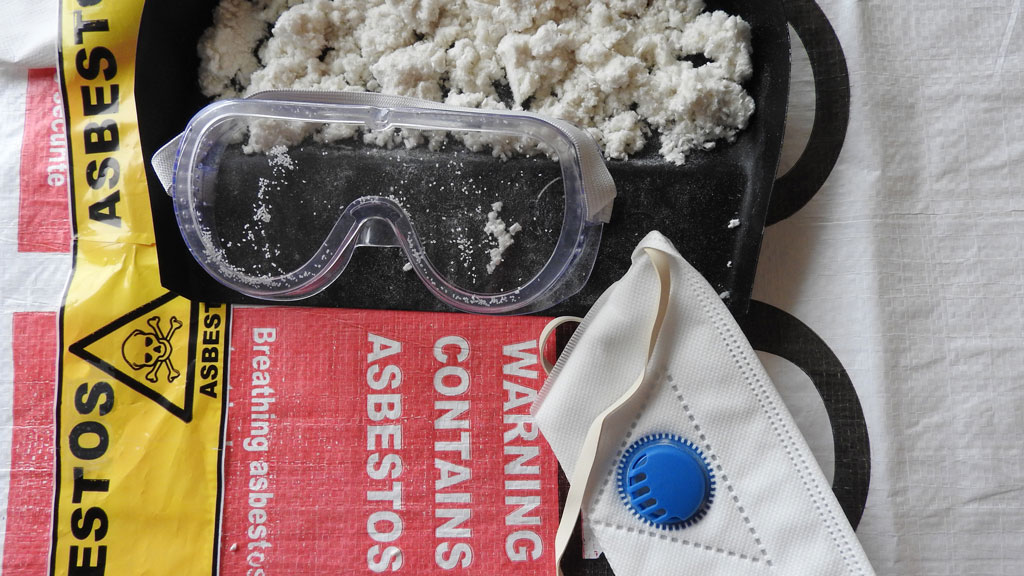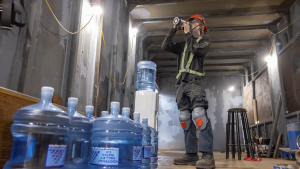As Canada’s third wave of asbestos-related deaths looms, B.C.’s government appears to be no closer to implementing the sweeping changes outlined in its December 2018 report on the asbestos industry, including licensing and standardized training.
“This is not controversial,” said Neil Munro, business manager for the BC Insulators Union 118. “I can’t understand why we are not doing it.”
Topping the list of recommendations endorsed by the union, the BC Federation of Labour (BC Fed) and the BC Building Trades (BCBT) is that surveyors carrying out asbestos assessment in buildings, companies involved in abatement, and consultants all be licensed.
“It is not time for a change — it is change long past due”
The labour trio also wants standardized training programs, accreditation of labs carrying out sampling, government incentives similar to those offered to remove urea formaldehyde and more disposal sites in B.C. as well as more control over disposal companies.
The Insulators Union responding to the B.C. government’s 2018 report, Keeping Workers, the Public and the Environment Safe from Asbestos, with its 16 industry recommendations urged speedy action.
“It is not time for a change – it is change long past due,” the union said in early 2019.
But by October 2020 a joint letter signed by Munro, Andrew Mercier, (former) executive director of the BCBT, and Laird Cronk, BC Fed president, to the five ministries involved in the study, plus WorkSafeBC, indicated a growing frustration with lack of action.
“Eighteen months later, no legislation has been introduced. This important report appears to be stalled inside government,” the letter said.
The government also hasn’t acted on a roundtable proposal.
Asbestos exposure is the No. 1 cause of occupational death in Canada,
— Asbestos.com
“In 2020, we proposed the government convene a roundtable of stakeholders, including WorkSafe, the BC Federation of Labour, industry, asbestos contractors and subject matter experts to develop a strategy that would include, among other aspects, contractor licensing, worker certification, consumer incentives for using licensed contractors and a comprehensive disposal plan,” said Brynn Bourke, BCBT interim executive director.
B.C. Labour Minister Harry Bains, whose has been involved in industry talks and whose ministry led the team compiling the 2018 report, issued a progress statement.
“We’re in the early stage and are exploring options of what a licensing requirement could look like. If we establish a licensing requirement, we would look to several Canadian and American jurisdictions to help inform the development of a model that would work in B.C.,” said Bains.
Washington, Oregon, the United Kingdom and Australia all have licensing systems in place.
Only Ontario and Alberta have developed training programs with certification.
The slow pace is in keeping with Canada’s past of lagging political will.
Asbestos.com, a U.S. and Canadian advocacy group, maintains Canada has one of the highest rates of mesothelioma cancer in the world, the legacy of being the world’s largest exporter of asbestos from mines in B.C. and Quebec.
“Asbestos exposure is the No. 1 cause of occupational death in Canada,” the organization’s site claims, pointing out its history of deaths among the most vulnerable, miners, those transporting asbestos and handling the natural fibre.
The site chronicles how in the U.S. and Canada government and companies covered up the health risks, which scientists and doctors were seeing as early as the 1900s and more markedly into the 1920s and 1930s as the latency of the asbestos diseases manifested in the first wave of deaths. Symptoms can take 20 to 50 years to appear.
The second wave of deaths are related to the construction industry as asbestos, a cheap and fire resistant fibre, was incorporated into homes, offices, institutions and commercial structure in more than 3,000 products ranging from carpeting and drywall to concrete and plumbing fixtures up until 1990. Construction workers and individuals working in shipyards were casualties of widespread use of products.
Canada one of the last countries to take action: May
MP Elizabeth May, former national Green Party leader and Sierra Club founder who chaired an international Ban Asbestos Now conference in 2003, said Canada staunchly supported the mining of asbestos.
“The initial reason that the Government of Canada didn’t act until recently was that it was defendant of asbestos sales it was carrying out around the world,” she said.
May said the first politician to take real action was Quebec premier Pauline Marois (2012-2014) who fulfilled a campaign promise to withdraw a $58 million subsidy to the asbestos industry promised by the previous John Charest government. The move shut down Quebec mines.
May said there are numerous incidents that show how rooted government patronage was to the industry.
Even the NDP was not blameless, she said, as it traded off supporting the miners’ unions to keep the mines open rather than support the construction trades.
NDP MP Pat Martin (1997-2015) and business manager of the Manitoba UBC Carpenters’ Union, was known for being vocal on how the asbestos products were harming his members but made no headway, she said.
May explained the Conservative government under Stephen Harper in 2011 voted to keep supporting the export of asbestos.
“Canada was subsidizing and exporting asbestos and contributing to over 100,000 workplace deaths around the world,” she said. “Canada was the worst and one of the last countries to take action.”
Canada did not ban asbestos in products until December 2018 after the federal government passed the Prohibition of Asbestos and Products Containing Asbestos Regulations which prohibited the import, sale and use of asbestos, as well as the manufacture, import, sale and use of products containing asbestos, with some exceptions.
The death toll of being exposed and building with asbestos products is documented in numbers. WorkSafeBC from 2000 to 2019 accepted 1,081 work-related deaths due to asbestos exposure with approximately one-third from the construction industry. In Alberta in 2018 there were 76 total occupational disease fatalities. Of these, asbestos was considered the main contributing factor in 37. In 2019 there were 80 total occupational disease fatalities, with 56 asbestos related. In Saskatchewan almost 45 per cent of all work related in 2019 were from asbestos exposures.
The third wave
The third wave of looming asbestos related deaths is in the demolition, renovation and restoration of older buildings that contain asbestos materials.
The Insulators Union estimates it will take 50 years to safely remove asbestos from all of buildings.
Andrew Swan, health and safety training officer for the Finishing Institute of B.C., said the figures for deaths related to asbestos going forward in the third wave are not expected to be as high as in early waves because of industry awareness and banning asbestos.
But there still remains a need for training.
Both Swan and Munro credit WorkSafeBC for making strides in creating both public and industry awareness and attempting to shut down unscrupulous operators who attempt to circumvent or ignore regulations.
Munro said it is these companies that dump bags of asbestos in alleys, send untrained and unprotected workers into buildings to remove asbestos, flaunt WorkSafeBC regulations, orders and fines and are creating the need for licensing.
Swan said there is also a growing concern regarding those doing the assessments as to whether they are properly trained and are providing faulty or falsified reports in order to expedite a demolition or construction project.
The Insulators Union, BC Fed and BCBT are asking the B.C.’s labour ministry to take the lead in implementing licensing as administration penalties, stop work orders, and costly court injunctions are not as effective as being able to pull a company’s license to operate.
The Insulators Union claims there were hundreds of thousands of dollars in fines unpaid to WorkSafeBC, with a Surrey company in 2018 owing as much as $1.1 million in fines for “repeated and flagrant” violations. In the same year, there were 37 administrative penalties totalling $237,386 with only 17 paying for a total of $66,256. Principal owners simply formed new companies.
WorkSafeBC has attempted a more costly court route and has issued 17 injunctions against companies and individuals involved in asbestos abatement to the end of 2020.
The Insulators Union has called the continued deaths in the industry “a needless human tragedy.”











I am one of very very few to survive this horrific disease, now cancer free.
I found out by accident July 15 2020 during a groin hernia operation.
Confirmed September 28 2020 as peritoneal mesothelioma.
I think I contacted it in kindergarten 1964 to grade 2.
We played with asbestos in school as modeling dough, of course we can’t forget painting our sculptures with lead based paint.
Others, by going to work to feed and raise their children, unknowingly contacted meso at work.
What a sad situation we find ourselves in.
Dieing trying to look after our loved ones.
What is their to say, especially when mom or dad passed it on to the kids.
It’s only a bit of dust from work, that won’t hurt you.
Now I own a 14 inch scar on my belly, and lots of missing pieces, my tremendously gifted Doctor’s in Toronto left me, trying to save my life.
They are the greatest surgeons in the world.
Period, bar none.
I owe them nothing short of my life.
Untill you have to hug and kiss your own family goodbye, you won’t understand asbestos and work safety.
A price we paid in full.
Al Kapitany